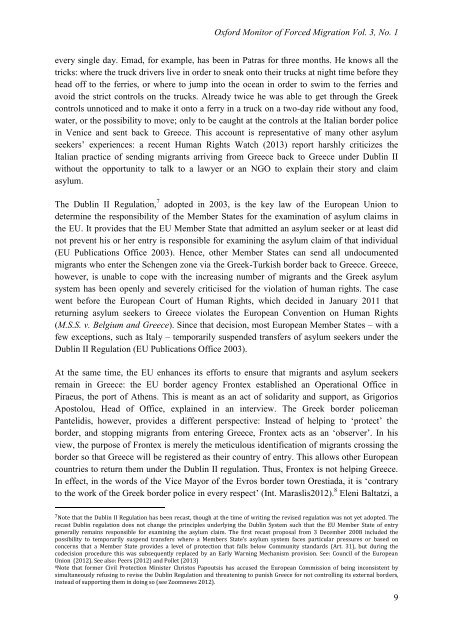OxMo-Vol.-3-No.-1
OxMo-Vol.-3-No.-1
OxMo-Vol.-3-No.-1
Create successful ePaper yourself
Turn your PDF publications into a flip-book with our unique Google optimized e-Paper software.
Oxford Monitor of Forced Migration <strong>Vol</strong>. 3, <strong>No</strong>. 1<br />
every single day. Emad, for example, has been in Patras for three months. He knows all the<br />
tricks: where the truck drivers live in order to sneak onto their trucks at night time before they<br />
head off to the ferries, or where to jump into the ocean in order to swim to the ferries and<br />
avoid the strict controls on the trucks. Already twice he was able to get through the Greek<br />
controls unnoticed and to make it onto a ferry in a truck on a two-day ride without any food,<br />
water, or the possibility to move; only to be caught at the controls at the Italian border police<br />
in Venice and sent back to Greece. This account is representative of many other asylum<br />
seekers’ experiences: a recent Human Rights Watch (2013) report harshly criticizes the<br />
Italian practice of sending migrants arriving from Greece back to Greece under Dublin II<br />
without the opportunity to talk to a lawyer or an NGO to explain their story and claim<br />
asylum.<br />
The Dublin II Regulation, 7 adopted in 2003, is the key law of the European Union to<br />
determine the responsibility of the Member States for the examination of asylum claims in<br />
the EU. It provides that the EU Member State that admitted an asylum seeker or at least did<br />
not prevent his or her entry is responsible for examining the asylum claim of that individual<br />
(EU Publications Office 2003). Hence, other Member States can send all undocumented<br />
migrants who enter the Schengen zone via the Greek-Turkish border back to Greece. Greece,<br />
however, is unable to cope with the increasing number of migrants and the Greek asylum<br />
system has been openly and severely criticised for the violation of human rights. The case<br />
went before the European Court of Human Rights, which decided in January 2011 that<br />
returning asylum seekers to Greece violates the European Convention on Human Rights<br />
(M.S.S. v. Belgium and Greece). Since that decision, most European Member States – with a<br />
few exceptions, such as Italy – temporarily suspended transfers of asylum seekers under the<br />
Dublin II Regulation (EU Publications Office 2003).<br />
At the same time, the EU enhances its efforts to ensure that migrants and asylum seekers<br />
remain in Greece: the EU border agency Frontex established an Operational Office in<br />
Piraeus, the port of Athens. This is meant as an act of solidarity and support, as Grigorios<br />
Apostolou, Head of Office, explained in an interview. The Greek border policeman<br />
Pantelidis, however, provides a different perspective: Instead of helping to ‘protect’ the<br />
border, and stopping migrants from entering Greece, Frontex acts as an ‘observer’. In his<br />
view, the purpose of Frontex is merely the meticulous identification of migrants crossing the<br />
border so that Greece will be registered as their country of entry. This allows other European<br />
countries to return them under the Dublin II regulation. Thus, Frontex is not helping Greece.<br />
In effect, in the words of the Vice Mayor of the Evros border town Orestiada, it is ‘contrary<br />
to the work of the Greek border police in every respect’ (Int. Maraslis2012). 8 Eleni Baltatzi, a<br />
7 <strong>No</strong>te that the Dublin II Regulation has been recast, though at the time of writing the revised regulation was not yet adopted. The<br />
recast Dublin regulation does not change the principles underlying the Dublin System such that the EU Member State of entry<br />
generally remains responsible for examining the asylum claim. The first recast proposal from 3 December 2008 included the<br />
possibility to temporarily suspend transfers where a Members State’s asylum system faces particular pressures or based on<br />
concerns that a Member State provides a level of protection that falls below Community standards (Art. 31), but during the<br />
codecision procedure this was subsequently replaced by an Early Warning Mechanism provision. See: Council of the European<br />
Union (2012). See also: Peers (2012) and Pollet (2013)<br />
8<br />
<strong>No</strong>te that former Civil Protection Minister Christos Papoutsis has accused the European Commission of being inconsistent by<br />
simultaneously refusing to revise the Dublin Regulation and threatening to punish Greece for not controlling its external borders,<br />
instead of supporting them in doing so (see Zoomnews 2012).<br />
9


